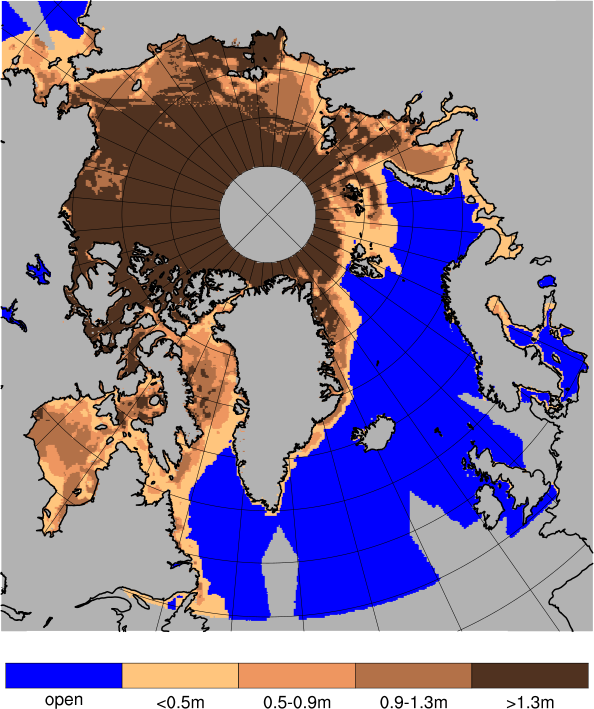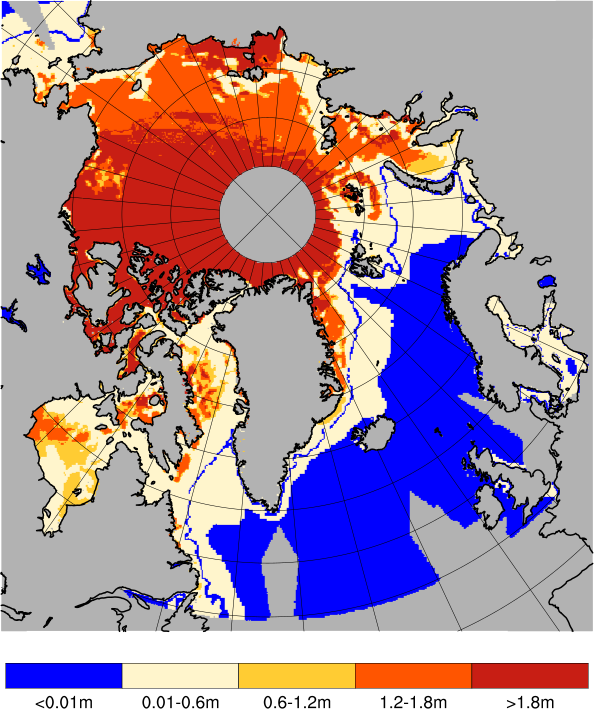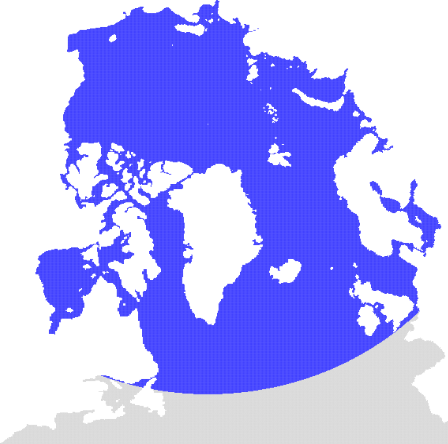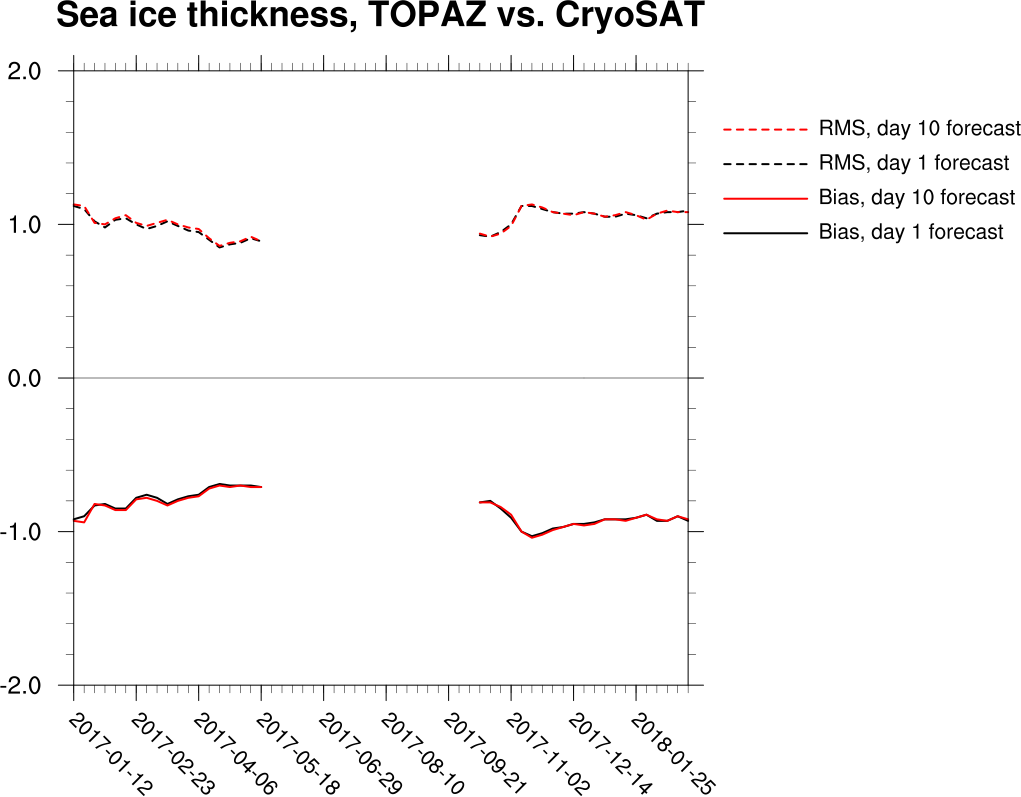Copernicus Marine Service Arctic MFC: Validation of thin sea ice
Validation based on satellite data from SMOS
Validation of the Copernicus Marine ARC MFC results for the thickness of thin sea ice is performed using a dataset which is derived from observations from the Soil Moisture and Ocean Salinity (SMOS) satellite. The sea ice thickness data are produced using an emperical algorithm developed by Tian-Kunze et al.. The algorithm takes advantage of data from the microwave radiometer onboard the SMOS satellite. The operational product has been documented by Kaleschke et al..
SMOS-based results for the thickness of thin ice are available (before Oct. 2019) from the Uni Hamburg OPeNDAP server at http://icdc.cen.uni-hamburg.de/thredds/aggregationSmosIcethicknessCatalog.html. From October 2019 SMOS data are available from Alfred Wegener Institute on ftp.awi.de/sea_ice/product/smos/v3.3/nh. SMOS processing was funded by the Support to Science Element Program from ESA.
Processing
We use results for the sea ice thickness and the uncertainty of these data, derived from the SMOS observations. Samples of these two fields are displayed below.

|

|
| SMOS sea ice thickness on 2017-03-09 | Thickness uncertainty on 2017-03-09 |
Before the comparison of model results and SMOS-based observations is performed, we restrict the validation region by requiring that the uncertainty does not exceed either 1 m or 75% of the seaice thickness (see the description of Data quality on the Sea Ice Thickness from L3C SMOS web page).
Next, the sea ice thickness bias and RMS difference between model results and observations are computed. Finally, the thickness distribution is categorized into pre-defined thickness classes, and the model/observation category match-up is displayed in contingency tables.
Validation based on satellite data from CryoSat-2
Validation of the Copernicus Marine ARC MFC results for the thickness of thick sea ice is performed using a dataset which is derived from observations from the CryoSat-2 satellite, using observations from its SAR Interferometric Radar Altimeter (SIRAL) instrument. The sea ice thickness data set we use based on the SIRAL observations is provided by the Centre for Polar Observation and Modelling (CPOM), which also provides details and references on data processing that is applied.
CPOM provides access to the sea ice thickness results in an interactive interface. Data are available from CPOM under http://www.cpom.ucl.ac.uk/csopr/sidata/.
Processing
We use results for the sea ice thickness, and the uncertainty of these data, derived from the CryoSat observations. The CryoSat data set consists of thickness data along the satellite tracks, aggregated over a 2-week period. Also provided are quality information represented by the standard deviation of these measurements. After discarding thickness values with standard deviations exceeding 75%, the thickness data are projected onto the ARC-MFC PHYS grid prior to the model-data comparison.
Next, sea ice thickness results from ARC-MFC PHYS simulations are averaged over the same 2-week period, and the region without data coveraged is masked. Based on the resulting set of observations and model results, basic statistical quantities are calculated, and maps of shaded contours for the products are plotted. Finally, the thickness distribution is categorized into pre-defined thickness classes, and the model/observation category match-up is displayed in contingency tables. Note that the tabulated dates above for the validation of the thick sea ice corresponds to the last day in the 2-week period under examination.
Region

|
The present version of the coupled sea ice and ocean circulation model used in Copernicus Marine Arctic MFC covers the Arctic Ocean, the North Atlantic Ocean and adjacent ocean regions. The northern part is depicted in the figure to the left. Validation of sea ice thickness from model results is performed for the domain indicated by the blue region in the figure. Note that the actual region for which the validation is performed varies from day to day due to limitations in the geographical coverage, and also due the screening of data resulting from regionally high estimated uncertainty in the observational product. Finally, the temporal observational coverage is restricted seasonally. SMOS data are provided for the freeze-up season since the SMOS data poorly reproduce the sea ice thickness in the melting season. CryoSat data are discontinued during the season when meltponds affect the data. Thus, essentially, both products are available during winter, and not available during summer. |
Time series

|
Since the CryoSat sea ice thickness data are not available as daily averages, the software for producing time series results cannot easily be adopted to this product. To the left is a time series tailor made for the comparison of sea ice thickness model results with CryoSat data. Shown here are results for the day 1 (black) and day 10 (red) forecasts, for bias (model-observations, full lines) and RMS differences (dashed lines). The two forecast ranges give nearly identical results, so the lines overlap. This time series plot will be updated intermittently only. |
ARC-MFC PHYS (TOPAZ)
The model results are produced with the TOPAZ ocean data assimilation model system. Presently, TOPAZ is run weekly with data assimillation one week prior to the bulletin date, followed by a one-week 100 member ensemble simulation ending on the bulletin date, and finally a 10 day deterministic forecast. TOPAZ was developed and is maintained by the Nansen Center.
ARC-MFC PHYS (TOPAZ) results are available as Copernicus Marine product ARCTIC_ANALYSIS_FORECAST_PHYS_002_001_a. An archive of historical forecasts are available from a thredds server.
